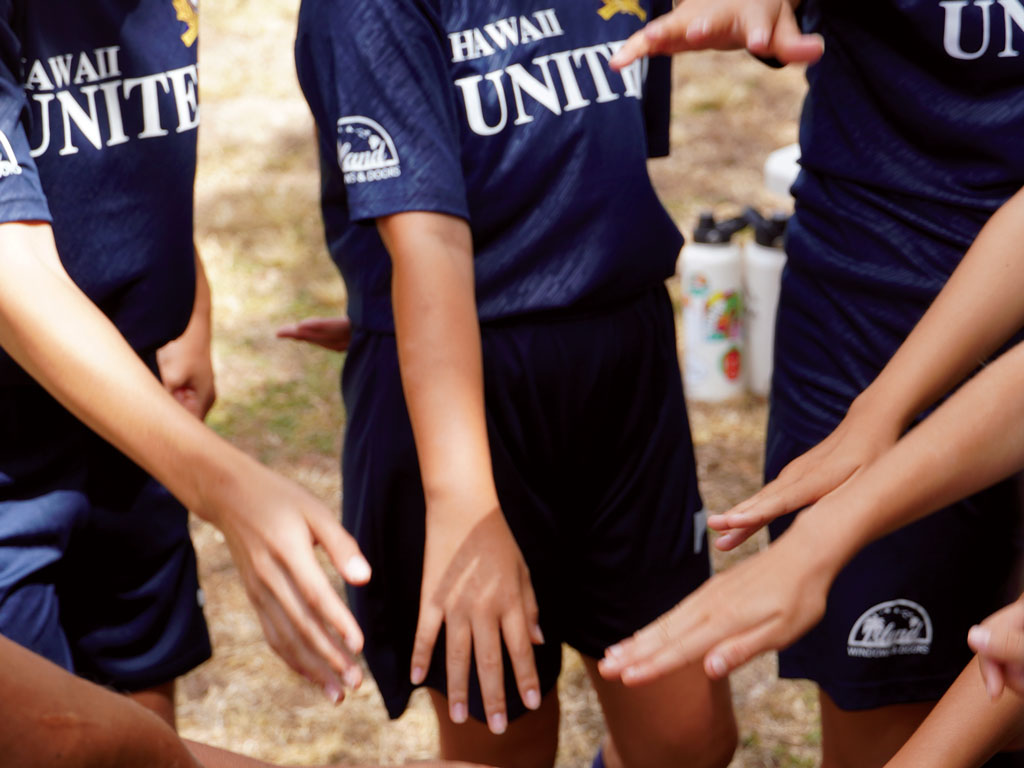by Connie Doma, Hawaii United FC
So, your child plays sports, but is he a sport? Are you?
We have all been there, experienced it firsthand, exhibited by our children, retweeted on social media, or watched it live at a stadium. No, it’s not the soccer game I’m referring to, it’s poor sportsmanship. Admit it, you’ve probably done it, the parent next to you has, and unfortunately, so has the coach. We argue with the referee, yell obscenities at the parents across the field, and moan in disappointment when our kids let in a goal. So how did it get this far and become so toxic? Isn’t this a kids sports after all? What happened to the fun?
There are many reasons why we enroll our children into team sports. For starters, sports are a healthy activity that increases our children’s physical fitness – strength, endurance, and flexibility – all of which has been proven to ward off illnesses and increase our life span. Of course, we also join sports for the love of the sport – to try to emulate the physical and strategic wonder displayed effortlessly by professionals. For others, sports are a positive distraction from too much electronic time, or simply idle time that could otherwise lead to negative influences. But most of all, we hope our children gain emotional and social benefits: respecting one another, playing as a team, gaining confidence, and learning good sportsmanship.
So, what is good sportsmanship?
Good sportsmanship is a catchall phrase that includes many values both on and off the field.
- Healthy Competition within your team and those across the pitch
- Winning graciously, being humble and not putting others down
- Losing graciously, not blaming another person or making excuses
- Accepting ALL the calls from the referee
- Accepting that referees can not see every single illegal slide tackle or foul, but he/she is trying to be fair
- Celebrating every player and understanding that each goal scored and saved is a collective team effort
- Not throwing in the game
- Encouraging conversations about doing our best, not simply winning
Creating a Positive Culture
Good sportsmanship is a culture that includes players, coaches, and parents. As parents, we are role modelling sportsmanship or lack thereof. Every time we yell at a referee about a call we disagree on we are teaching our children exactly the opposite of sportsmanship. Every time we yell at our kids to foul their opponent because the last foul wasn’t called sends a message. As parents and guardians, we must teach our children how to be good sports, and that is infinitely more difficult if we aren’t good sports ourselves.
Off the pitch, our children are listening to our conversations. Every negative comment that we make about another player, team, coach, or referee teaches our children that they too do not need to respect others and that their unhelpful comments are acceptable. Slowly, this negativity becomes more common until it becomes the dominant force. Instead of teaching our children to blame and disrespect others, even if we aren’t doing it on purpose, we should be focusing on encouraging their hard work and effort.
Healthy Competition Starts with the Team
The foundation of good sportsmanship also includes healthy competition within the team. Coaches are responsible for cultivating an environment that emphasizes the collective success of the team, and not simply the last player who puts the goal into the net. They must teach our children that a team is by definition a group of individuals who work together for a common goal (no pun intended). Each player is involved when making a play: building up from the back, the goalie passes to the defender; the defender finds the mid-fielder on the wing; and the winger clips it to the striker, and the striker is going in on goal!
Coaches, as well as players and parents, can never lose sight of the team and the collective effort. If you want to see good sportsmanship, start with a healthy competitive team.
Fostering Sportsmanship
Every time a player demonstrates good sportsmanship it should be recognized, just as every time a player demonstrates poor sportsmanship it should be addressed. If your team loses, teach your players to use it as a learning opportunity – what could we have done better, should we try harder, practice more. And when your team wins, the focus is on how the team played well together, how they created opportunities to put the ball into the net. Each conversation can be used as a moment to reinforce good sportsmanship.
Parents, guardians, and coaches – shouldn’t we protect this sport that we all love? The next time we are at the practice field or at a game, be a sport and help your children become one as well.





